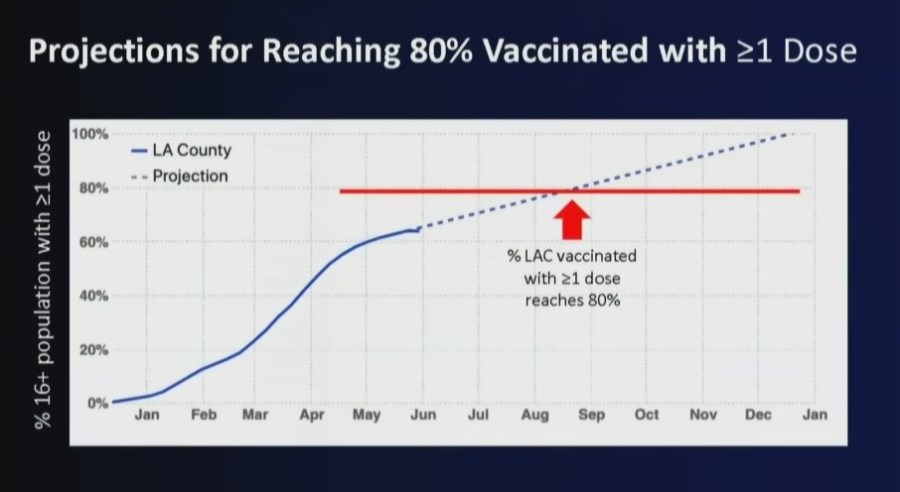With the number of people getting vaccinated each week continuing to decrease, public health officials now expect Los Angeles County won’t reach herd immunity before late August.
Another 1.1 million residents need to get their first dose before 80% of those age 16 and older countywide are vaccinated, and the county is currently giving out about 100,000 shots a week. That means herd immunity will take a month longer than previously expected, L.A. County public health Director Barbara Ferrer said in a news briefing Wednesday.
“Obviously, we would like for this to happen sooner,” she said. “So we’re hoping that with easier access and more opportunities to get questions answered about vaccine safety we can increase the number of doses we’re administering each week.”
That current vaccination rate compares to about 500,000 people getting inoculated each week at its peak, Ferrer said. As of Wednesday, 64% of L.A. County residents 16 and older had received at least one dose.
Health officials still aren’t sure of the exact proportion of residents who need to be vaccinated to halt the virus’ uncontrolled spread, but they’re estimating it’s around 80%. Experts say that will help protect those who can’t get a vaccine, which includes more than 1.3 million children under age 12 countywide.
“This is why it’s so important to vaccinate as many people who are eligible as possible while we wait for vaccines to be available for children under 12,” Ferrer said.
Officials hope vaccine incentives being offered, like being entered into a season passes sweepstakes for professional L.A. sports teams, and an expansion of mobile inoculation sites in hard-hit communities can encourage the hesitant to get a shot. At some sites, up to 50% of people come in asking about the week’s sweepstakes, Ferrer said.
But even amid the push toward herd immunity, vaccination rates among Black and Latino residents are lagging.
Only 41% of Black residents and 48% of Latino residents age 16 and older have at least one dose, compared to 64% of the general population. And although 53% of residents are fully vaccinated, this is only true for a little more than a third of Black residents and 38% of Latinos, Ferrer said.
“This is really concerning,” she said. “As we’ve witnessed, Black and brown residents as essential workers bore the brunt of this pandemic, especially noticeable during the surge. If they’re not protected by the vaccine with the lifting of public health safety measures, they can again have the highest risk of getting infected, being hospitalized or dying from this virus.”
And in fact, Black residents are now experiencing the highest rates of infection, hospitalization and death due to COVID-19.
“These inequities reflect many complicated issues, including the distribution of resources and opportunities that people need for optimal health and well-being,” Ferrer said. But she asked that those who are vaccinated in the hardest-hit communities reach out to friends to encourage them to do the same.













